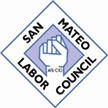Speier, Gordon, Mullin Discuss Income Inequality, Labor Issues
Income inequality was a major theme at a meeting with elected officials hosted by the San Mateo County Central Labor Council February 7. Congresswoman Jackie Speier set the tone for the meeting by commenting that, “I don’t want to talk about the work I am doing in Washington, D.C.—I want to talk about last Friday night, when I spent the night in a homeless shelter.” Speier said she wanted to shine a light on income inequality by staying overnight at the Maple Street Shelter in Redwood City January 31.
“In San Mateo County, we have the working homeless,” Speier said. The Congresswoman said that part of the problem was that, “the minimum wage is woefully inadequate.” She pointed out that the minimum wage is only worth 40 percent of what it was in 1968, and that even at $10 an hour it would only have 60 percent of the earning power it had in 1968. She said some of the working poor are union members. “One woman was working at Safeway, her spouse was working at OfficeMax, their son was working—and here they had to stay in the shelter to save up money for a deposit to get an apartment,” she said.
“Labor does a great deal to help people get good salaries and benefits, but we have to think more about helping those in need,” she said “When you see a homeless person, it might be the person bagging your groceries. In one of the richest counties in the richest country, people are struggling to afford housing.” She said extending unemployment benefits was the least that Congress could do to help people who are struggling.
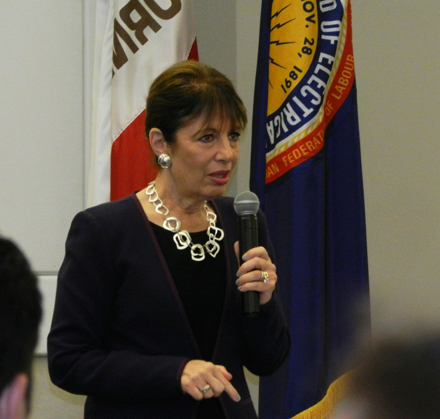
Congresswoman Jackie Speier
Speier received positive media coverage for her action and was praised by residents of the shelter for listening to their stories. She told the SF Chronicle Feb. 6, “I’m still kind of reeling from the experience. Every member of Congress should be required to do what I did. It would help us appreciate who we are talking about. We rattle off numbers, but it doesn’t speak about the people themselves.”
Following Rep. Speier’s comments, Assembly Members Rich Gordon and Kevin Mullin spoke about their work. Gordon noted that, “The gap in San Mateo County between income levels is getting wider.” He pointed to his own District, which includes the working class and low-income community of East Palo Alto and the highly affluent enclave of Atherton.
Rich Gordon noted that when he arrived in Sacramento as a freshman Assembly Member three years ago the State had a huge budget deficit. “Thanks to the Governor and having Democrats in control of the Legislature, we now have a surplus,” he said. “Labor helped with support for temporary tax measures like Prop. 30, but we also created the surplus by cutting services like education and the social safety net. We need to bring back those social safety net programs and help the people Congresswoman Speier is talking about. We need to work hard to create jobs for the middle class—union jobs.”
Assemblyman Mullin also referenced wealth disparity and said a critical issue is housing affordability. “The State is the poster child for the affordable housing crisis, and San Mateo County is Ground Zero,” he said. The State has no affordable housing policy, he noted, and with the loss of Redevelopment, there is little funding for affordable housing development. “The government needs to do more,” he said.
Mullin said that while Prop. 30 gave us a surplus, “We could see revenue drop because we have an extremely volatile tax structure.” He said the “rainy day fund” in the governor’s proposed budget was a band-aid. “We need to stabilize the revenue stream for state government,” he said. Mullin said the State would need to face the challenges of the $71 billion in unfunded pension liabilities for the State Teachers Retirement System. “I’m glad we don’t have the $20 billion deficit we had before I took office, but we still have many issues and challenges,” Mullin said. “There is a huge warning sign out there with the income gap, which corresponds with political polarization. When the middle class is hurting, people blame others; but the root is income inequality.”
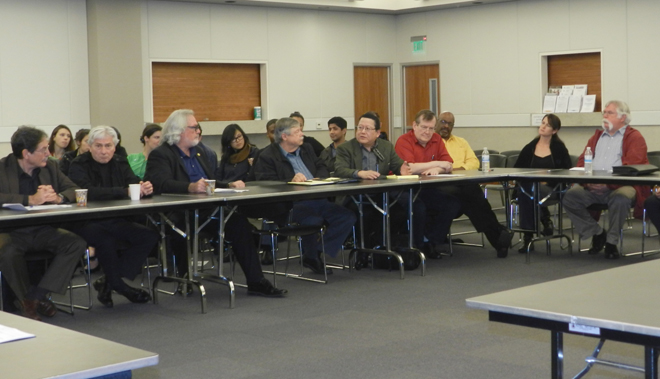
Labor’s Concerns
After their comments, Speier, Mullin, and Gordon answered questions from union members. Stan Kiino of the Association of Flight Attendants said the airline workers needed support to stop the FCC and FAA from allowing cell phone usage on flights. He said the union was pleased that the policy of allowing knives on flights was stopped but that, “We need legislative mandates to enforce the rules.” Kiino also said that Flight Attendants at United Airlines were facing involuntary furloughs as the airline merged with Continental Airlines. “The AFA has worked hard to save jobs and help keep our colleagues working, but we may lose almost 900 flight attendants with forced furloughs and the loss of seniority.”
Congress Member Speier said she had signed on to a bill to stop the authorization of cell phone use on flights and had also opposed allowing knives onboard. Speier said she had drafted a letter to United Airlines about the furloughs. “During the hearings in Congress on the merger, it was made clear that there would be no layoffs,” she said. She promised to follow up on the issue.
Greg Brown of Machinists Local 1782 said that United Airlines and its contractors at SFO were requiring employees to get their security badges on their own time. Brown said the badges are mandated by the Department of Homeland Security, and workers should be compensated for their time in obtaining or renewing the badges. Brown and Whitfield McTair of SEIU United Service Workers West spoke about the huge inconvenience, travel time, and costs their members face in having to come to SFO during the limited hours the security office is open. Speier said she would talk to SFO Director John Martin or United Airlines officials.
Speier was asked by SMCLC Executive Secretary-Treasurer Shelley Kessler about her position on privatizing some of the work done by the US Postal Service, like allowing Staples office supply stores to set up postal service counters in their stores where workers are paid less than the unionized USPS workforce. Speier said she did not support privatization of USPS work and was working on legislation that would give the USPS an opportunity to expand. Speier said Congress had tied the hands of the Postal Service by not allowing it to compete with UPS and FedEx on package deliveries. She said she would introduce legislation that allowed the USPS to package and deliver alcohol and wine, and the private parcel delivery companies could handle the delivery of packages for the last mile to an address for a customer signature.
Other issues discussed which Ms. Speier said she would follow up on were cuts to Express Routes in the County by SamTrans and ensuring that construction work in San Francisco by the Housing Authority is done by union building trades members. David DeLaTorre of Laborers Local 261 asked Speier to help stop the harassment of the largely immigrant and Latino workforce the Laborers union represents. He said many contractors are being audited by Immigration and Customs Enforcement, and the threat of raids by ICE agents hurts and scares workers and their families. Speier said the E-Verify program that enables employers to check a worker’s legal status is now voluntary, but if it was required as part of immigration reform, it would eliminate raids and deportations.
High School teacher Jerry Reed, a member of AFT Local 1481, said many teachers have concerns about the new requirements of the Common Core curriculum that came out of the No Child Left Behind Act. Reed said School Districts would face high costs in implementing the curriculum with the purchase of new text books and computers. He said the plan was developed by high tech entrepreneurs, and not educators. Congresswoman Speier commented that the federal government has a limited role, supplying only 13 percent of funding for education. She said Common Core is a voluntary program but acknowledged that states can get a waiver from the federal government from requirements of NCLB by implementing Common Core. She said that NCLB was a flawed program and would not be renewed by Congress.
Assemblymember Rich Gordon addressed the issue of funding for implementing the Common Core standards, and said the state’s Local Control Funding Formula was set to ensure that funding goes to education and not for just buying computers. “We want to add a second year of funding for implementation of Common Core and teacher training,” he said.
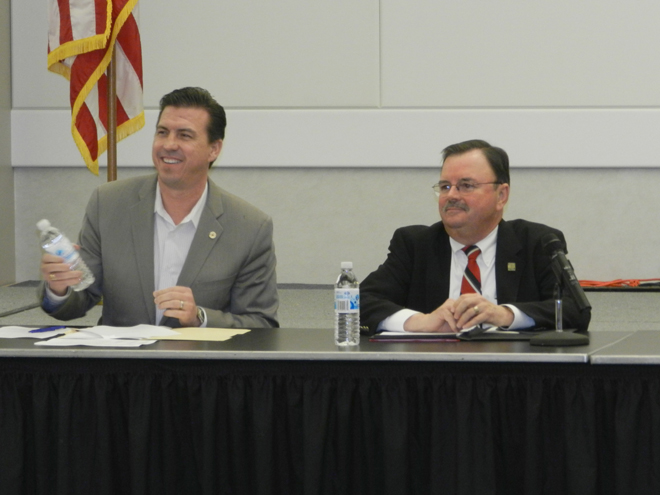
Assembly Members Kevin Mullin and Rich Gordon.
The discussion shifted to state and local issues, with Assembly Members Mullin and Gordon answering concerns about education, affordable housing, local control of fire services, and election campaign funding. Gordon said it was important to keep CCSF open and that the legislature could reform the accreditation process. “A private company should not be able to close a public institution,” he said.
Mullin said that the vote for the Local Control Funding Formula, “was the biggest vote I made as a freshman” and that he understood that it would address the imbalance in funding between districts. “I voted with the understanding that districts wouldn’t lose money,” he said. “We are aware of the issue of school districts being negatively impacted and are working on it in the Legislature.”
Jerry Reed said legislators should be aware of efforts by so-called education reformers to undermine public education through groups like “Students First” (which promotes charter schools that could open the door for vouchers and privatization). Reed said campaign finance reform was needed to expose who is behind measures to “reform” education. Gordon said there could be a ballot measure that diminishes public education supported by pro-privatization forces. He said AB 800 in the Legislature would mandate the disclosure of funders behind ballot measures. Gordon noted that anti-labor forces had laundered money through a non-profit based in Arizona to try to pass Prop 32 in 2012, and proponents weren’t required to disclose where their funding came from.
Mullin said he supported AB 800 and that since the US Supreme Court had equated money with speech in the Citizens United case, the only way to fight vested interests was through disclosure. Mullin said there is a correlation between big money spent in elections and its influence on votes and public policy. “This is a basic issue,” he said. “We spend too much time on fundraising versus governing. Special interests hold sway in Sacramento.” Cheryl Brown of AFSCME Council 57 asked that the legislators work with the state labor federation on any campaign finance reform to make sure it doesn’t hamper Labor’s ability to support campaigns. Gordon noted that Labor is already required to disclose campaign spending, and that AB 800 “targets those who don’t disclose.” He said, “We want to balance it so it does not disadvantage our side.”
Shelley Kessler noted that Common Cause, the campaign reform group that is often allied with Labor, had proposed that approval of the language in ballot measures be taken away from the state Attorney General and given to an appointed commission. Gordon and Mullin said they opposed the plan and want to keep the function with the Attorney General. The Assembly Members also said they oppose the pension reform measure proposed by San Jose Mayor Chuck Reed, and support the expansion of paid sick days through AB 1522.
Joel Abelson of Firefighters Local 1879 asked for help in making sure that fire services are locally controlled. He said that the State, through Cal Fire, is taking over many local contracts. He acknowledged that the Cal Fire employees were fellow union members, but said the local fire districts should be staffed with local firefighters. Rich Gordon said Cal Fire is supposed to be a rural fire fighting service and stated, “I have a problem with Cal Fire taking over local fire departments; it undercuts work rules and I am not in favor of that.” Mullin noted that in the era of climate change, “we are fighting fires in January,” and Cal Fire would be busy and have enough work. He said he supported local control.
Tina Acree of AFSCME Local 829 said the State needs to do more to make sure housing is affordable to middle class families. Mullin said housing affordability was problematic in a high cost county like San Mateo. He cited a recent study that found that when housing costs are factored in, one in four people in the County are living in poverty. “It’s the downside of prosperity, and we are at the epicenter and have to respond,” he said. “We need to rebuild the union movement in the private sector and help public sector workers.”
Gordon said the State doesn’t have a policy to fund affordable housing or workforce housing with the loss of redevelopment. He said there are efforts in the Legislature to develop new sources of funding for affordable housing.
Other issues discussed included problems at the San Mateo Events Center, changes in TSA policies at SFO, and fast-tracking trade deals.
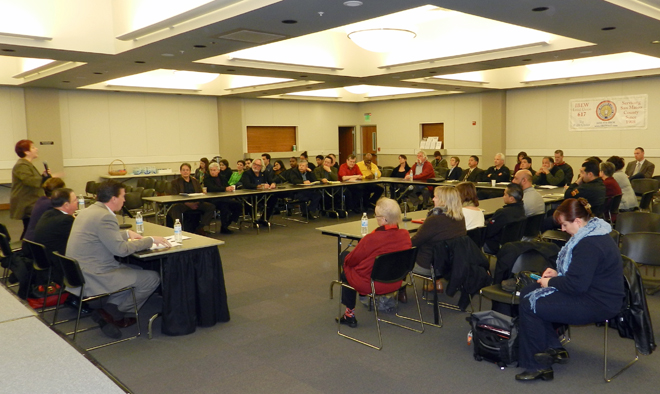
Unions represented at the meting included AFT 3267 and 1481, AFSCME 829, IAFF 2400, Sign & Display 510, SEIU-USWW, Flight Attendants, Painters District Council 16, Sprinklerfitters 483, Carpenters 217, IBEW 617, Operating Engineers 3, Elevator Constructors, Machinists 1782, Laborers 261, ATU 1574, CWA District 9, and California Teachers Association.
March 2014
|

